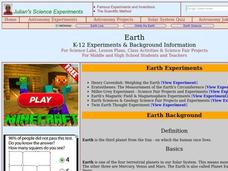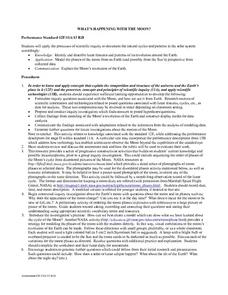Curated OER
The Reasons for the Season
Students explain the reason for the changes in season. In this instructional activity examining the relationship between the Earth and the Sun, students use an applet to discover how the alignment of the Earth and the Sun cause the...
Curated OER
Earth
Students study the earth in relation to the solar system. For this planetary lesson students complete several investigations into the measurement of the earth and its magnetic field.
Curated OER
Scale Model of the Solar System
Students explore the size of the planets. In this science lesson, students create a scale model of the solar system. Students determine a scaling factor and calculate the size of their planets. Students create a scale drawing of the...
Curated OER
LCROSS Moon Mission
Learners read to discover the sequence of events of the LCROSS moon mission. In this space science lesson, students read an article about the LCROSS moon mission and the events that took place. After reading, learners answer...
Curated OER
Microbial Influence on Earth's Systems
Students identify the different biogeochemical cycles on Earth. In this biology lesson, students observe microbes under a microscope. They compare and contrast respiration and photosynthesis.
Curated OER
The Sun Affects Earth
Third graders read, write, and listen to information about the sun and its effects on the Earth.as it relates to its axis, orbit, rotate, and revolution. In this solar system instructional activity, 3rd graders examine...
Curated OER
Our Changing View of the Solar System
Students identify and name the eight planets and the five dwarf planets in our solar system. In this space science lesson, students view a slideshow of the planets and label them on an included Solar System chart.
Curated OER
How Big Are Earth, Sun, and Moon?
Third graders draw what they believe is in space on a dry erase board. In groups, they are given a beaker half filled with water and they add a teaspoon of oil, observing the different layers that form. To end the lesson, they identify...
Curated OER
The Solar System Word Search
In this solar system word puzzle worksheet, learners examine the 26 words and names in the word bank and locate them in the word search puzzle.
Curated OER
The Solar System Word Search 2
In this solar system word puzzle worksheet, students examine the 26 words an names in the word bank and locate them in the word search puzzle.
NASA
When Do Lunar Eclipses Happen?
Who needs the daylight to simulate a lunar eclipse? Astronomers model the positions of the Sun, Earth, and Moon to explain the necessary conditions for a lunar eclipse. Investigators cut and label a paper plate to represent the Earth and...
University of Colorado
Distance = Rate x Time
Every year, the moon moves 3.8 cm farther from Earth. In the 11th part of 22, classes use the distance formula. They determine the distance to the moon based upon given data and then graph Galileo spacecraft data to determine its movement.
Workforce Solutions
A Colony for Lunar Living
Two lessons explore the possibility of living on the moon. First, scholars read various scenarios to identify which careers would best transfer to life in space. Finally, pupils examine a website to locate items made for outer space,...
Messenger Education
Exploring Exploring
The reason people first began trading was because of their desires for objects other societies possessed. In the activity, classes discuss why exploration has been a common thread in all societies and where these desires have taken...
It's About Time
Orbits and Effects
What does your world revolve around? Challenge the class as they learn about orbits and the effects of them on our modern world. Young astronomers begin by measuring ellipses and calculating the eccentricity of Earth's orbit. Then,...
NASA
Evaluating a Lunar Eclipse
Do all lunar eclipses look the same? Find out in an activity where astronomers use the Danjon Scale of Lunar Eclipse Brightness to describe the color and brightness of the moon during an eclipse. Explorers make three observations using...
Curated OER
What's Happening With the Moon?
Young scholars review the process of scientific inquiry. Using this information, they identify the patterns and cycles of the moon as it revolves around the Earth. In groups, they model the phases of the moon from the Earth and Sun's...
Curated OER
Earth, Sun and Moon
Young scholars investigate that the sun is at the center of the solar system through role play. One student is the sun and one student is the Earth. The students then show how the Earth orbits around the sun. Young scholars view a...
Curated OER
Phases of the Moon
Young scholars use a simple physical model of the Earth, sun, and moon to understand why the moon changes phases from the perspective of Earthly observers. They hold up balls representing the moon in a room with a single light source to...
Curated OER
Solar System
In this Solar System learning exercise, students are quizzed. Students answer questions about the solar system and the planets and other celestial bodies that comprise it.
Curated OER
Flying Through the Solar System
Learners create a model of the solar system out of candy. They write a book about their travels through the Solar System, beginning at age ten and reaching Pluto at age seventy.
Curated OER
The 'Solar' System Past and Present
Students identify cardinal and intermediate directions, recognize that models changes due to new or improved observations and technology, identify the major characteristics of the planets including their positions in the solar system,...
Curated OER
Solar System: Let's Take a Trip
Third graders consider outer space. In this introductory solar system lesson, 3rd graders complete a KWL chart and listen to the story The Magic School Bus: Lost in the Solar System, by Joanna Cole & Bruce Degen. They will contribute...
Curated OER
Solar System Slide Show
Students work in small groups to research a planet in our Solar System in order to compare it to Earth. They examine the planet's size, atmosphere, rotation and revolution periods, temperature, and other attributes. They collect...

























